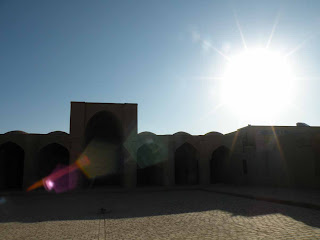An Atashkaddeh or fire temple in Damghan, a very small town in Eastern Iran,
once called The City of a Hundred Gates
There was a time when the fire that burned in this fire temple, or Atash Kaddeh as the Persians call it, defied the sun. The defiant flames of that fire formed the pillars of power for one the most powerful empires on earth called the Persian Empire. In those distant days, that fire held people's beliefs and delivered it to the emperors that held major chunks of the then world in their hands, defeated the Roman Empire three times and literally took captive one of Rome's emperors by the name of Valerian making him the only emperor in history who was captured by an enemy. Today, however, as the sun rises each day, it does not find any signs of its rival here. This fire temple was turned into a mosque by the conquering Muslims and in recent days was recognized as an ancient, historical site worthy of special protection. The ancient Zoroastrians did not let the fire die even for a second. In the above picture, however, it seems that even the sun is not able to shed enough light on it to be seen.
Some doors are not meant merely to take us inside a place . Through such doors we can pass through history and go back thousands of years. Let us enter.
The above pillars and arches belong to the Sasanid period -- more than two thousand years ago. My children are playing hide and seek between them in the following pictures--the way so many kings did throughout history. Unlike my children, however, nobody is able to find those losers or even a tinge of their glories.
Below is one of the Mihrab's in which the Zoroastrian Moghs or clergymen constantly kept their fire alive. Today, however, as Henry David Thoreau said only "the sun is his fire."
A closer view above. The pillars hold the building, but the fire which burned inside the above Mihrab was the true pillar which gave power to the Persian Emperors.
Arches and pillars again. Sometimes I felt I heard the footsteps of so many people throughout history who have walked through these pillars as we are doing.
My companions were in a hurry and we had to leave. It is hard to stay long at a place where emporers didn't last. Through the above door we returned to the contemporary life.
A flower just outside the temple. Life goes on not in huge temples, but in tender flowers like this. Just think of all those poems which Omar wrote when he witnessed such tiny flowers beside these huge temples!










